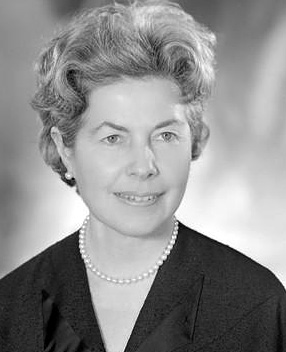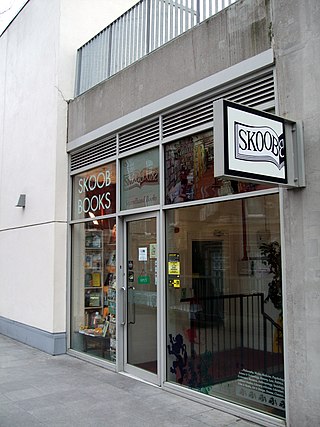
W & G Foyle Ltd. is a bookseller with a chain of seven stores in England. It is best known for its flagship store in Charing Cross Road, London. Foyles was once listed in the Guinness Book of Records as the world's largest bookshop in terms of shelf length, at 30 miles (48 km), and of number of titles on display. It was bought by Waterstones in 2018.

The London Review of Books (LRB) is a British literary magazine published bimonthly that features articles and essays on fiction and non-fiction subjects, which are usually structured as book reviews.

Christina Agnes Lilian Foyle was an English bookseller and owner of Foyles bookshop.

Neil Richard Ardley was a prominent English jazz composer and pianist, who also made his name as the author of more than 100 popular books on science and technology, and on music.
Elizabeth Jesse Young was a London-based literary critic and author, who wrote principally on cult writers for a range of British newspapers and magazines. In particular she championed transgressive fiction, for which she received some criticism in the press, not least for her defence of A. M. Homes' The End of Alice, which dealt with themes of paedophilia from what was seen as an uncomfortably neutral perspective.
Glad Day Bookshop is an independent bookstore and restaurant located in Toronto, Ontario, specializing in LGBT literature. Previously located above a storefront at 598A Yonge Street for much of its history, the store moved to its current location at 499 Church Street, in the heart of the city's Church and Wellesley neighbourhood, in 2016. The store's name and logo are based on a painting by William Blake.

Shakespeare and Company is an English-language bookstore opened in 1951 by George Whitman, located on Paris's Left Bank.

Gay's the Word is an independent bookshop in central London, and the oldest LGBT bookshop in the United Kingdom. Inspired by the emergence and growth of lesbian and gay bookstores in the United States, a small group of people from Gay Icebreakers, a gay socialist group, founded the store in 1979. These included Peter Dorey, Ernest Hole and Jonathan Cutbill. Various locations were looked at, including Covent Garden, which was then being regenerated, before they decided to open the store in Marchmont Street in Bloomsbury, an area of the capital with rich academic and literary associations. Initial reluctance from Camden Council to grant a lease was overcome with help from Ken Livingstone, then a local councillor, later Mayor of London. For a period of time, it was the only LGBT bookshop in England.
Dark They Were and Golden Eyed was a science fiction bookshop and comic book retailer in London during the 1970s; the largest of its kind in Europe. Specialising in science fiction, occultism, and Atlantis, the central London shop also played a key role in bringing American underground comics to the United Kingdom. It also sold American editions of mainstream science fiction books that were not easily obtained anywhere else.

The Oscar Wilde Bookshop was a bookstore located in New York City's Greenwich Village neighborhood that focused on LGBT works. It was founded by Craig Rodwell on November 24, 1967, as the Oscar Wilde Memorial Bookshop. Initially located at 291 Mercer Street, it moved in 1973 to 15 Christopher Street, opposite Gay Street.

The Gotham Book Mart was a famous Midtown Manhattan bookstore and cultural landmark that operated from 1920 to 2007. The business was located first in a small basement space on West 45th Street near the Theater District, then moved to 51 West 47th Street, then spent many years at 41 West 47th Street within the Diamond District in Manhattan, New York City, before finally moving to 16 East 46th Street. Beyond merely selling books, the store virtually played as a literary salon, hosting meetings of the Finnegans Wake Society, the James Joyce Society, poetry and author readings, art exhibits, and more. It was known for its distinctive sign above the door which read, "Wise Men Fish Here". The store specialized in poetry, literature, books about theater, art, music and dance. It sold both new books as well as out-of-print and rare books.

Daunt Books is an independent chain of bookshops in England, founded in 1990 by James Daunt. It originally specialised in travel books. In 2010, it began publishing. James Daunt later became the managing director of Waterstones and the US bookstore chain Barnes & Noble.
The Silver Moon Bookshop was a feminist bookstore on Charing Cross Road in London founded in 1984 by Jane Cholmeley, Sue Butterworth, and Jane Anger. They established Silver Moon Bookshop to share intersectional feminist rhetoric with a larger community of readers and encourage open discussion of women’s issues. The shop served both as a safe space for women to participate in literary events and a resource center to learn about local feminist initiatives. The owners of Silver Moon Bookshop eventually expanded into the publishing field through establishing Silver Moon Books, as well as creating the store newsletter Silver Moon Quarterly.

Sylvia Whitman Hon. FRSL is the proprietor of the Shakespeare and Company in Paris, France, the celebrated bohemian bookstore known for welcoming readers and writers from around the world.

New Beacon Books is a British publishing house, bookshop, and international book service that specializes in Black British, Caribbean, African, African-American and Asian literature. Founded in 1966 by John La Rose and Sarah White, it was the first Caribbean publishing house in England. New Beacon Books is widely recognized as having played an important role in the Caribbean Artists Movement, and in Black British culture more generally. The associated George Padmore Institute (GPI) is located on the upper floors of the same building where the bookshop resides at 76 Stroud Green Road, Finsbury Park, London.

St. Mark's Bookshop was an independent book store, established in 1977 in New York City's East Village neighborhood. It was the oldest independent bookstore in Manhattan owned by its original owners. The shop, run by proprietors Bob Contant and Terry McCoy, specialized in cultural and critical theory, graphic design, poetry, small presses, and film studies—what the New York Times called "neighborhood-appropriate literature". It featured a curated selection of fiction, periodicals and journals, including foreign titles, and included unusual-for-bookstores sections on belles-lettres, anarchists, art criticism, women's studies, music, drama, and drugs.

Heywood Hill is a bookshop at 10 Curzon Street, in the Mayfair district of London.
Anne Walmsley is a British-born editor, scholar, critic and author, notable as a specialist in Caribbean art and literature, whose career spans five decades. She is widely recognised for her work as Longman's Caribbean publisher, and for Caribbean books that she authored and edited. Her pioneering school anthology, The Sun's Eye: West Indian Writing for Young Readers (1968), drew on her use of local literary material while teaching in Jamaica. A participant in and chronicler of the Caribbean Artists Movement, Walmsley is also the author of The Caribbean Artists Movement: A Literary and Cultural History, 1966–1971 (1992) and Art in the Caribbean (2010). She lives in London.

Skoob Books is a bookshop selling secondhand books focusing on academic subjects, located in the Brunswick Centre, in Bloomsbury, central London, UK.

The Antiuniversity of London was an anti-establishment, alternative education project founded in London in February 1968. Established as a "free university", it was initially based at 49 Rivington Street in Shoreditch; a building owned by the Bertrand Russell Peace Foundation which had previously been used by the Vietnam Solidarity Campaign.















